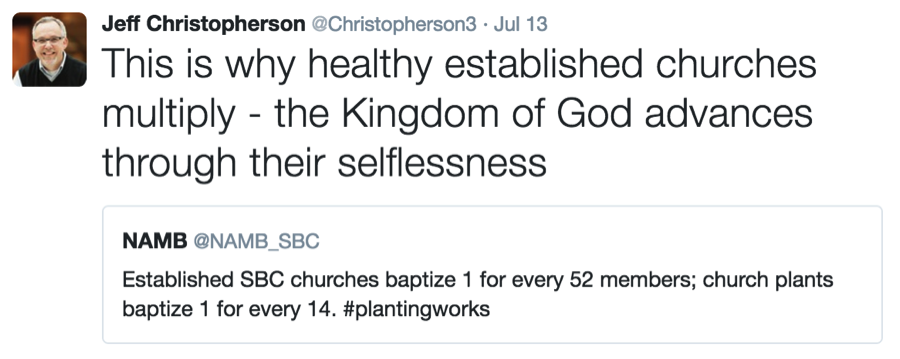The question, “Am I called to be a church planter?” is not a straightforward one. It’s not like, “Should I breathe?” or “Should I love others as Jesus does?”
The question, “Am I called to be a church planter?” is kind of like asking, “Should I go into an Arts program, Science Program, or a Trade Program?” What’s implied behind this question is the importance of further education. So the question is more a matter of, “Which route will you take?”
Or it’s like the question, “Should I eat a pop-tart for breakfast?” Yes, obviously you need to eat food, but if you eat a pop-tart for breakfast, how is that going to affect what you eat for lunch? And how will you deal with the sugar crash and belly rumblings mid-morning?
When we look at the biblical commandment to “Go, therefore, and make disciples of all nations,” the natural outflow of that is the planting of new churches.
We see this through the Early Church and how the apostles preached the gospel, made disciples, and planted churches that then preached the gospel, made disciples, and planted churches. I mean, just look through the book of Acts! And then look at how the New Testament was written to new churches in their respective life situations. Essentially, the New Testament can be seen as an anthology of church plants. The fact is, just like we all need to eat food or we will die, we need to all be about church planting, or the church will die.
So the better question that we need to answer is, “Am I called to be about church planting?”
And let me make this easy for you. If you’re a follower of Christ, the answer is a default yes.
Now there are people who will object to church planting and will say things like,
- “Isn’t one larger church better than a lot of smaller churches?” Well, the fact is, it’s not an either/or. Both are good and necessary, but according to our recent State of Church Planting research, we discovered that new church plants are extremely effective at winning people to Christ. So while there isn’t anything wrong with larger churches, there is definitely something wrong if we don’t plant new ones!
- “We have enough churches!” Based on the census data from 2011, there are 11 churches for every 10,000 Americans. Now unless, there are mega churches in every neighborhood in this country, there simply aren’t enough churches. Add that to the fact that our population continues to increase, and the numbers speak for themselves.
We all need to be about church planting.
But the next question we have to ask ourselves is, “Am I called to be a church planter?” That question is a bit more complex.
In the second edition of Planting Missional Churches, we walked through a few of the characteristics of Paul, the church planter, throughout the New Testament. Here’s a few of his characteristics:
- He was an evangelist (Acts 9:19-22)
- He was entrepreneurial (Rom. 15:20-23)
- He empowered other leaders (Titus 1:5)
- He cared for people (Acts 20:17-21)
- He stayed committed to his calling despite the sacrifice (Acts 16:25)
How many of those characteristics do you identify with? It’s not enough to just be excited about the idea of planting a church, being the boss, and not having to do ministry the way others do. Planting a church is much more nuanced than that. If those are the types of reasons that are pushing you to plant, you will fail, the enemy will have his way, and the cumulative aftermath will be devastating.
So who is the ideal church planter? What does a church planter look like?
There certainly isn’t one type of church planter, since there isn’t just one type of church. Depending upon the model you choose, and the context that you plant in, the type of planter will differ.
However, regardless of model and context, the fact is that every planter and pastor needs to first put themselves up against the biblical qualifications as outlined in passages like 1 Timothy 3. For example, planters need to be above reproach, able to teach, self-controlled, not lovers of money, and so on. Be sure to read through this passage and put yourself up against it.
In addition to that list, there are a few other indicators that will give you a glimpse into whether or not God is calling you to be a church planter:
1) Starter. Do you have a pattern of starting things? Lemonade stands, Bible studies, compassion-based ministries, and the like? Are they still around after you’ve left? You will be doing this over and over again in planting.
2) Equipper. Do you always have to be the one doing the work of ministry? Or can you lead and equip others to do the work of ministry? How about leading others who lead others? This is our task as church leaders and pastors—to be equippers, not doers as we read in Ephesians 4:11-13. Without this, your church will never break the 50 barrier or grow beyond your personal leadership lid.
3) Dreamer. Do you long to make a greater impact and change this world? Do you see the world in a different way? Can you help people catch that vision? This hunger and drive is critical for church planters.
4) Doer. No I’m not contradicting myself from point two. Instead, I’m asking, Do you execute, follow through, and get things done? There are many pastors, church planters, and visionaries who love the dreaming stage so much that they can’t actually get things done.
If you see those four indicators in your life, God may be calling you to plant. If you see some, but not others, perhaps this is the best time to develop those competencies.
Now what if you said yes to all four of those indicators?
Well, you need to ask yourself a few qualifier questions:
1) Do I have a burden and a calling to specifically plant a church? In your time with God, is this something that God continues to bring up? I’m not asking if you’re interested in the idea. I’m asking if God is laying this on your heart.
2) Does my family support us planting a church? If you’re married, God will not lead you to start a church if it means you have to leave your spouse and kids. This is because you can’t see planting a church as your day job, and expect it not to seep into the rest of your life! On our New Churches Q&A Podcast, we recently received a question from a guy who became a follower of Christ after getting married, and who is now in ministry. His spouse is still not yet a believer, yet he feels called to plant. The answer is, “Not yet! Wait!”
3) Does my church support me? Do others affirm this calling? If your church and friends are hesitant about your calling and gifting to plant a church, then you should also be hesitant. Are you allowing others to speak into your life? Are you currently sitting under the authority of another pastor, denomination, or team? If not, then why? If yes, then what are they saying about your decision? Involve them into your decision-making process as soon as possible.
If you answered yes to all of the above questions and indicators, then here are a few next steps that I would encourage you to consider:
- Get pre-assessed using a tool like churchplanter.lifeway.com. This is the only statistically verified church planting pre-assessment out there. So check it out.
- Check out Essential Church Planting. Ed and I developed this course for this very purpose.
Now let’s remember. We are all called to be ABOUT church planting, but we are not all called to be church planters.
God may be calling you to be a student minister, an executive pastor, a worship minister, a launch team member, a funder, an elder, or to be pastor of a church that multiplies and sends out church planters. Regardless of your specific role, the fact is we are all called to be ABOUT church planting.










